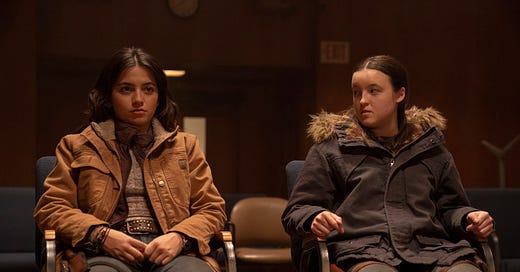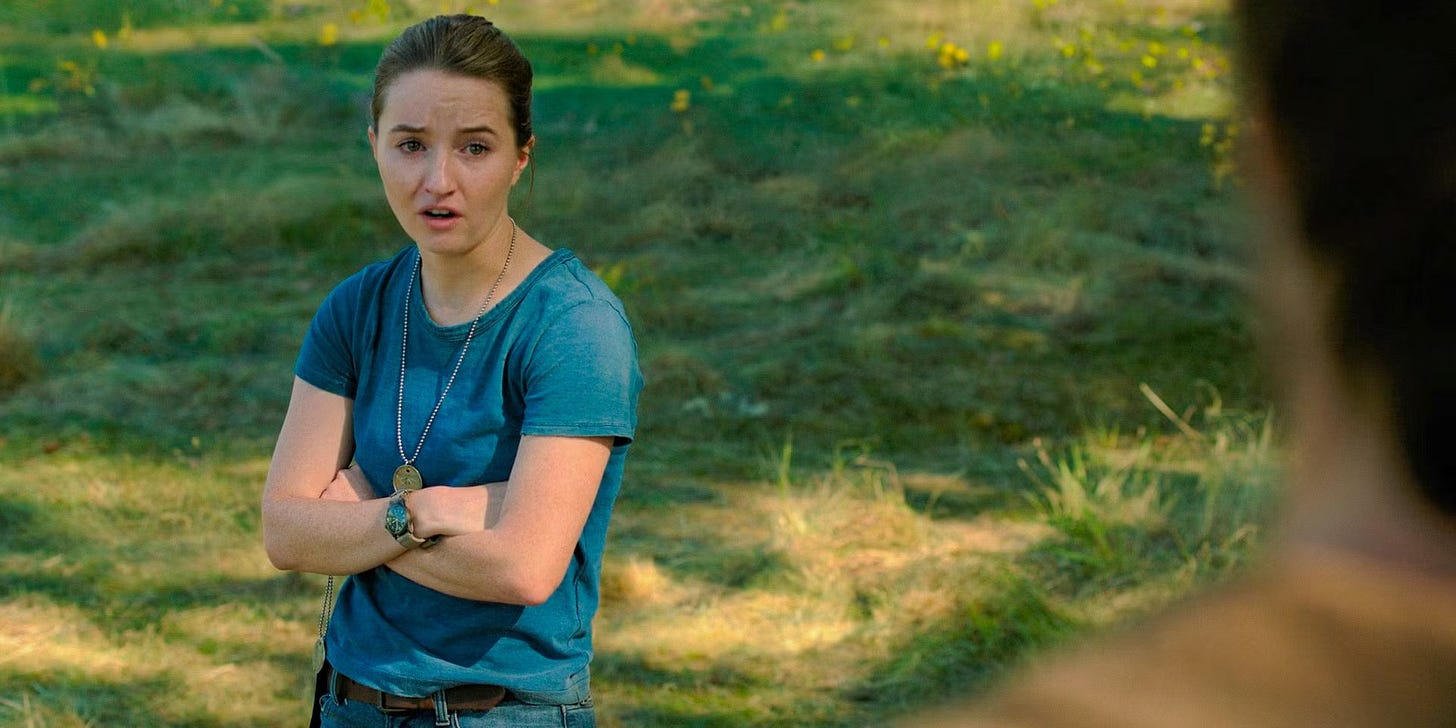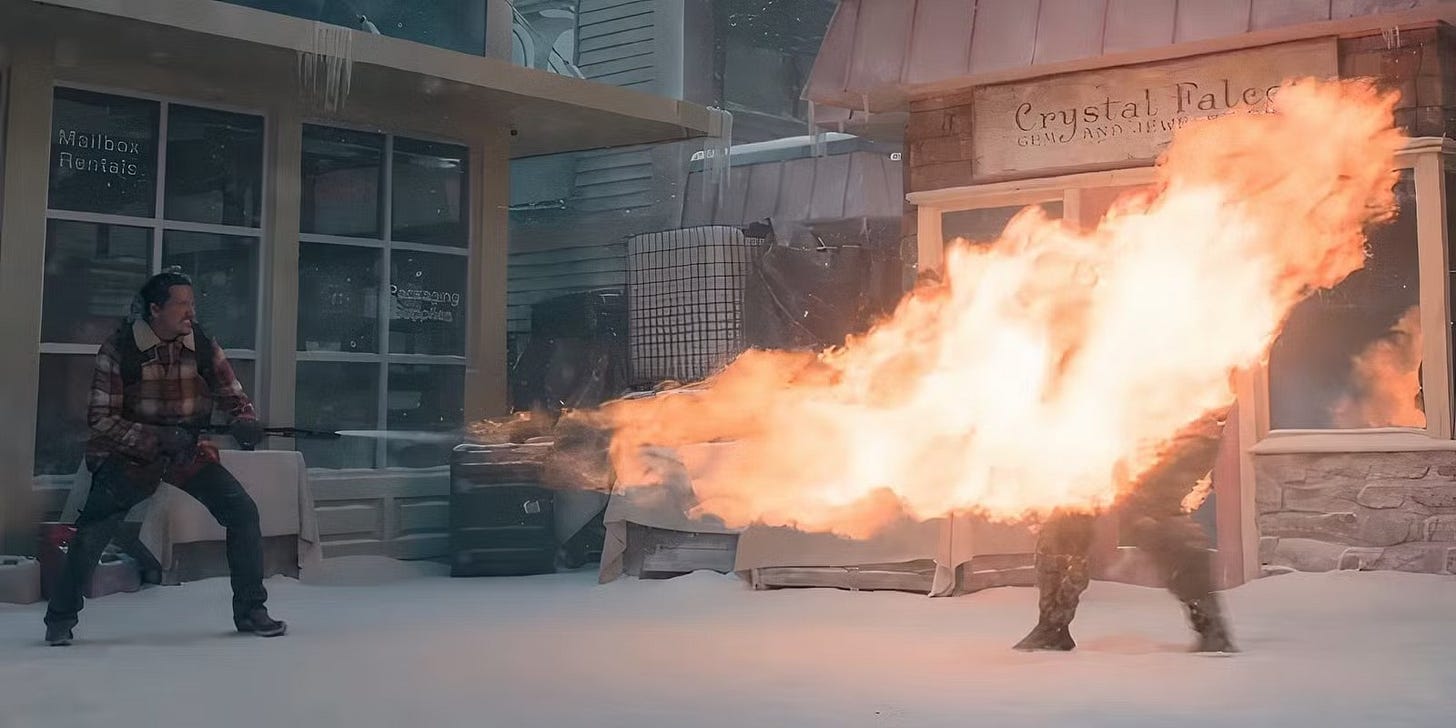‘The Last of Us’ Season 2: YMMV
Killing off a major character is always a risk, and this time it probably won’t pay off.
NEW STANDARD DISCLAIMER: This newsletter aggressively spoils things.
If you’ve watched The Last of Us season 2 (or at least the first four episodes of the season, or if you’ve played the video game on which the show is based1) you know that the writers killed off the character of Joel Miller (Pedro Pascal). This was a shocking move if you’re coming into the story without prior knowledge because Joel is one of the two main characters, the other being Bella Ramsey’s Ellie. Even folks who knew what was coming because of the video game might have been a little surprised they killed him off so early in the season—waiting until later would have made sense in terms of keeping the audience engaged and off-balance2.
On paper, this is one of those bold moves that should elevate a story3. When George R.R. Martin famously killed off Ned Stark in Game of Thrones just when it looked like Ned Stark was going to be the main protagonist of the entire series4, it was a shocking moment that kicked the story into legendary airspace, and that moment is often referred to when people talk about The Last of Us.
But there are specific mechanical reasons this trick worked a charm in Game of Thrones and doesn’t work well (so far) in The Last of Us. Mainly, the Game of Thrones universe was a lot bigger.
I Saved Her
Don’t get me wrong: I’m enjoying the second season of The Last of Us. I didn’t think the first season was genius—the word I used was cromulent—but it was well-made and entertaining. The same can be said for Season 2—it’s totally fine, often a lot of fun, as zombie apocalypse shows tend to be5. But killing off Joel has actually caused problems for this narrative in a way that killing Ned Stark didn’t for Game of Thrones. In fact, killing Ned actually improved that story in many ways. So how come a similar move in The Last of Us feels less effective?
The key is character weight. In Game of Thrones, Ned was a heavy character, capable of being a protagonist and carrying a lot of plot and theme. But he wasn’t the only heavy character, and certainly not the only protagonist-level character6. In the novels, there were so many POV characters you could choose among dozens to promote to a Main Character at any moment. While Ned’s death was shocking because he seemed destined to be our guide and entry to this world for years/books to come, the story had a deep bench of other characters it could pivot to7.
The Last of Us, on the other hand, is essentially a two-hander—or was. Sure, there were other characters, but the only two characters with plot and theme weight to them were Ellie and Joel. Removing Joel is shocking, but it unbalances the whole show, because there isn’t any other character capable of taking on that kind of weight.
So Much For Happy, Proud Rainbowtown
As I write this we’re only four episodes in to the second season, so things might change. At the moment, the show seems set on making Ellie’s friend/love interest Dina (Isabela Merced, delightful) the other half of the two-hander dynamic. While replacing Joel’s gruff middle-aged dude energy with Dina’s manic pixie energy8 offers some interesting writing and story options, it remains to be seen if the show’s basic structure can be sustained by the new dynamic, but it’s going to be a heavy lift. Where Game of Thrones already had several characters with real depth to carry the show forward, Dina basically arrived at the beginning of this season and hasn’t been fleshed out much. She feels like an extension of Ellie, not an independent character like Joel was9.
The easiest way to see the difference in their weight is to imagine each character off on a tangent, a separate story. You can imagine Joel and Ellie involved in separate adventures, each equally interesting and compelling10. But it’s difficult to imagine caring what Dina is up to if she’s not with Ellie. If Dina were to wander into her own timeline, it’s a much heavier lift to keep viewer interest than it would have been with Joel11.
Impossible? Of course not. You can certainly write Dina into a compelling character with a lot of weight and then send her off on her own adventures. It would take time and some good writing, but of course it could be done. The difference is that when Ned Stark died the writers didn’t have to do any of that, because they had some hefty characters already developed and ready to pick up the slack.
Oh well, The Last of Us will probably run for 17 seasons and redefine television, and I’ll be celebrating finding a quarter on the sidewalk on my way home from my job as a Walmart Greeter. Maybe a zombie apocalypse wouldn’t be so bad12?
NEXT WEEK: Babygirl and the Character Vacuum
If you enjoy this newsletter, consider subscribing to my paid fiction Substack, Writing Without Rules: From the Notebook!
It’s interesting how adaptations of video games are either grimdark horrorfests or silly shenanigans featuring chicken jockeys with nothing in-between. That’s it, that’s the footnote.
Also, Pedro Pascal is a charisma machine. If you’ve got him under contract my advice is to have him in every scene even if it doesn’t make narrative sense.
I write that as THE UNCHALLENGED KING of Bold Moves That SHOULD Elevate My Story But ACTUALLY DON’T. You know, I might not be as good at this writing thing as I think I am.
Although, at this stage, how surprising is it when Sean Bean dies in a story? He literally always dies. The moment you see him in character, you’re filling out sympathy cards.
As long as there’s an epic zombie battle every three episodes or so, I’m content to watch whatever boring bullshit you come up with. Three-hour city council meetings to decide whether it’s okay to eat zombies? Deal me in, as long as the fourth hour is people blowing up zombies with dynamite or something.
One could argue—and one assume George R.R. Martin himself would endorse this argument as he stares into the void that Winds of Winter has become—that there are actually too many protagonist-level characters in ASoIaF.
Eventually landing on Bran the Broken for reasons I assume and expect will make sense one day. If not, we riot.
At least she brings that manic pixie dream girl vibe to plotting asssasinations and organizing ammunition instead of ruining people’s lives with unpredictable emotional swerves.
This show more than any other makes me ponder hygeine in the apocalypse, because these people wear the same clothes every day, are elbow-deep in zombie fluids at all times, and never take a shower or wash their hands. Are yeast infections and ringworm not a thing in the future?
To be fair, though, I’d watch Pedro Pascal flossing and be entertained. Man crush? I have no idea what you’re talking about.
Maybe a musical episode? Oh, jebus, I better not have jinxed us all with that joke.
Of course it would be. Way too much running.







And I'm poor.
Honestly, most of the shows you critique, I haven't watched. I read them for the humor that you inject in the notes.
It's a sad life that I lead...